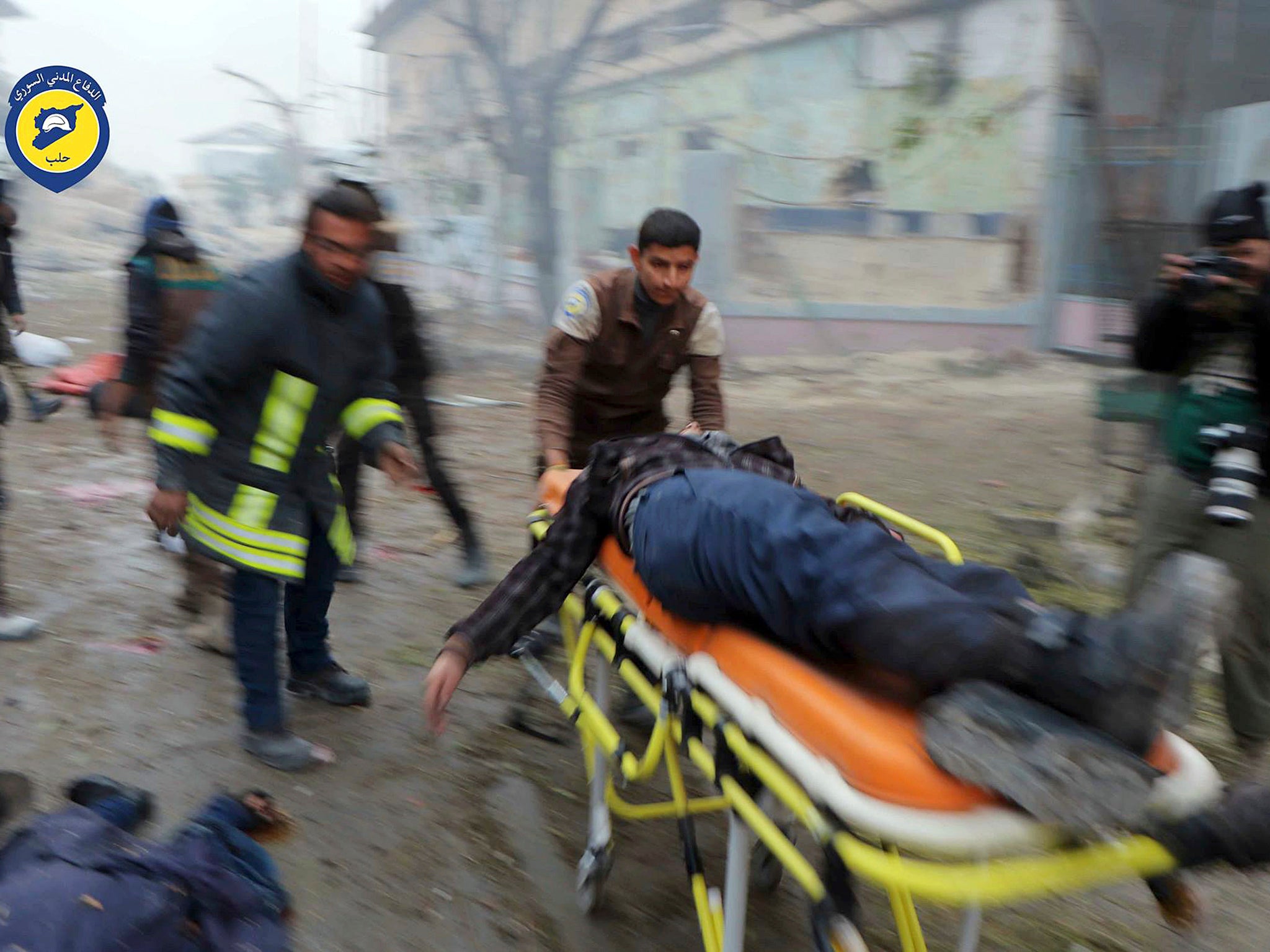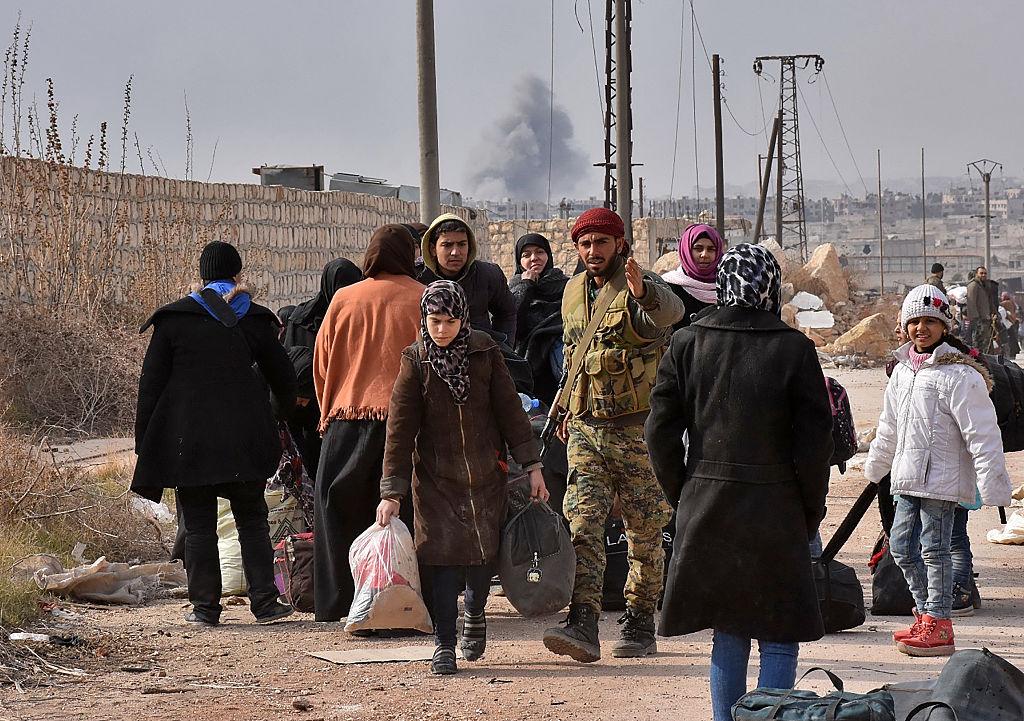Aleppo risks becoming 'one giant graveyard', UN warns as Syrian and Russian forces continue advance
'Aleppo is on the verge of being wiped from the face of the earth,' warns British representative

Your support helps us to tell the story
From reproductive rights to climate change to Big Tech, The Independent is on the ground when the story is developing. Whether it's investigating the financials of Elon Musk's pro-Trump PAC or producing our latest documentary, 'The A Word', which shines a light on the American women fighting for reproductive rights, we know how important it is to parse out the facts from the messaging.
At such a critical moment in US history, we need reporters on the ground. Your donation allows us to keep sending journalists to speak to both sides of the story.
The Independent is trusted by Americans across the entire political spectrum. And unlike many other quality news outlets, we choose not to lock Americans out of our reporting and analysis with paywalls. We believe quality journalism should be available to everyone, paid for by those who can afford it.
Your support makes all the difference.Rebel-held Aleppo risks becoming “one giant graveyard”, a United Nations humanitarian chief has warned as Syrian government troops continue a bloody advance backed by air strikes.
Representatives of Bashar al-Assad’s regime and Russia clashed with British and American delegates at a heated emergency Security Council meeting as battles continued in the city on Wednesday.
Stephen O’Brien, the Under-Secretary-General for humanitarian affairs, said international law had been systematically disregarded in the ongoing civil war, with Aleppo becoming the “apex” of a growing catalogue of horrors.
“For the sake of humanity, we call on, we plead, with the parties, and those with influence, to do everything in their power to protect civilians and enable access to the besieged part of eastern Aleppo before it becomes one giant graveyard,” he said. “There are no limits or red lines left to cross. The rules of war - sacrosanct notions borne out of generations of costly and painful lessons and set more than 150 year ago in the First Geneva Convention - have been systematically disregarded in Syria."
Mr O’Brien accused warring parties of showing they were willing to take any action to secure military advantage, even if it meant killing, maiming or besieging civilians.
Harrowing footage published by the White Helmets volunteer rescue group showed a street littered with corpses and body parts after civilians fleeing eastern Aleppo were reportedly hit by artillery fire. Shoes, clothing, suitcases and bags could be seen among puddles of blood and flesh.
A 10-year-old girl was reported to be among those killed by shelling on Wednesday, with UK-based Syrian Observatory saying more than 300 civilians, including 33 children, had been killed since government operations intensified on 15 November.
Syrian forces and allies from Iran, Russia and Hezbollah have seized control of around 40 per cent of territory that has been under rebel control since 2014, causing an estimated 50,000 civilians to flee.
Those reaching regime forces have been put under arbitrary arrest on suspicion of links to opposition groups, with hundreds of men from east Aleppo reported to have disappeared.
Residents of rebel-controlled districts – where 100,000 children are among those trapped - have been under siege for nearly 150 days, with access to clean water scarce, humanitarian food stocks exhausted and medicine in desperately short supply.
The UN says only one trauma unit remains in opposition areas after all hospitals were hit by multiple air strikes.
While Syrian and Russian media hailed the “liberation” and “stabilisation” of eastern Aleppo, Staffan de Mistura, the UN’s Syria envoy, said that tens of thousands of civilians were living under constant threat in opposition-controlled areas.
He said that although the UN had received “reliable reports” that rebel groups were preventing civilians from leaving their territory, residents in eastern Aleppo should be allowed to unconditionally receive aid.
Another 700,000 people are trapped in other besieged areas across the country, mostly in rural Damascus, Mr de Mistura said, adding: “It may be too late for many of the people of eastern Aleppo, but surely this Council can come together, stop the brutality and also prevent a similar fate doesn’t befall other Syrians.”
British and French delegations called the Security meeting to discuss the “urgent humanitarian situation” in Aleppo but hopes for a ceasefire allowing civilians to flee or access aid looked no closer after almost three hours of talks.
Matthew Rycroft, the UK’s Permanent Representative to the UN, said the Security Council had “completely failed to act” through five years of bloodshed in Syria because of Russia’s vetoes in favour of its ally – President Assad.

“History may show that it is perhaps the most horrific conflict of our lifetimes,” he told delegates.
“The Syrian regime and Russia have been executing a plan that has now laid one million people under siege.
“And executing is an all too appropriate word. Because without a change in policy, without a change of heart, that’s exactly what this is - the slow, painful, bitter execution of a million Syrians, cut off from aid convoys, cut off from the world.”
Mr Rycroft said UN proposals to allow aid convoys access to besieged areas were denied permission because of a succession of “excuses” by the Russian and Syrian governments.
“What’s the excuse for employing the medieval tactic of siege?” he asked.
“What’s the excuse for the continued bombardment? For dropping bombs at a disturbing rate over the homes of children and families? What’s the excuse for the continued endorsement of war crimes?”
American representative Samantha Power echoed his comments blaming Russia for blocking UN action, criticising Vladimir Putin’s government and his Syrian allies for claiming images of the horror in eastern Aleppo were fake when they “had significant expertise in making things up” themselves.

Vitaly Churkin, Russia’s representative to the Security Council, hit back by repeating claims his country was “combating terrorism” and that Syria’s moderate opposition had joined jihadi groups.
He accused the UK and France of attempting to “use terrorists” to oust President Assad, accusing the UN Security Council meeting of being to save them from inevitable destruction.
Syria’s delegate, Bashar Ja’afari, condemned Egypt, Spain and New Zealand for drafting a resolution calling for a 10 day ceasefire in Aleppo without his government’s input.
“It is high time to end this political theatre,” he said, blaming Isis and al-Qaeda’s former affiliate Jabhat al-Nusra for violations.
As the war of words continued, the advance by Assad’s forces and supporters on eastern Aleppo showed no sign of slowing amid a hail of shelling, air strikes and reported chemical attacks.
“The ancient city of Aleppo, as we know it, is on the verge of being wiped from the face of the earth,” Mr Rycroft warned.
“Today, we speak of reaching those who remain. Tomorrow, there may not be an Aleppo to reach.”
Join our commenting forum
Join thought-provoking conversations, follow other Independent readers and see their replies
Comments